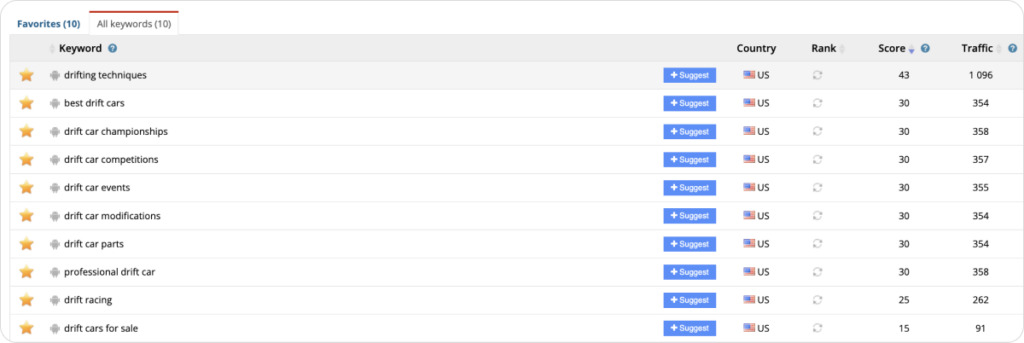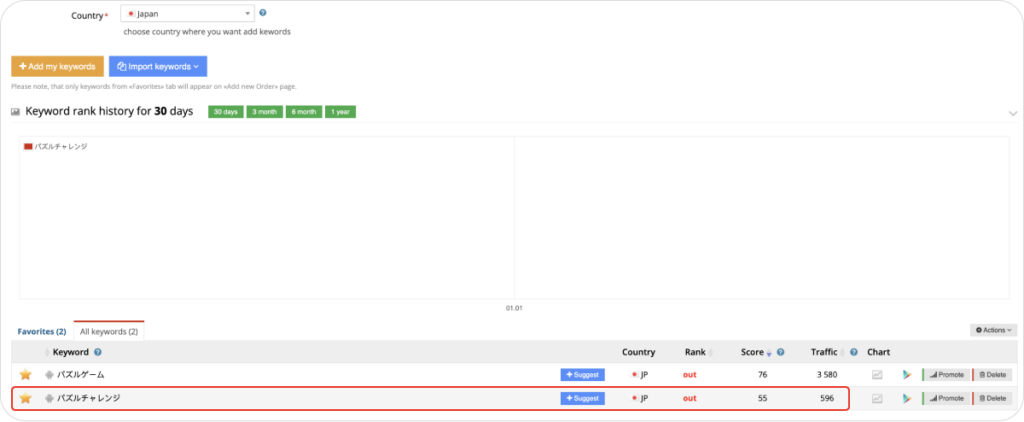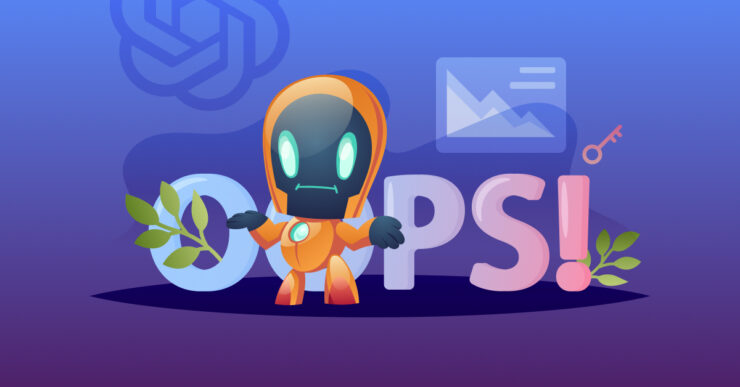In our modern era, the use of AI is growing rapidly, and the introduction of ChatGPT has only added to its popularity. AI-powered language models like ChatGPT are capable of handling various tasks related to creating content, which has led to their widespread adoption in the field of marketing. The applications of AI in marketing are diverse and powerful. One notable area where AI, such as ChatGPT, has made a significant impact is in assisting with ASO and keyword promotion for mobile apps. You can read cases, articles, and watch videos on our YouTube channel about ASO and Keyword promotion with ChatGPT. These involve using AI to help identify and optimize the keywords that can make an app more visible and attractive to potential users.
For instance, AI can help app developers and marketers analyze the most relevant keywords for their app, taking into account factors like competition, search volume, and user intent. This assists them in making informed decisions about which keywords to target for maximum impact. Furthermore, AI can aid in crafting compelling app descriptions, engaging social media posts, and persuasive ad copy. These are critical components of a successful app marketing campaign, as they directly influence how users perceive and interact with the app.
Despite the significant potential that AI offers in mobile app keyword promotion, there have been instances where its assistance has fallen short, leading to unfavorable outcomes. Let’s explore a few stories where AI-powered keyword promotion strategies didn’t yield the expected results.
- Be Careful: Check the Keyword Relevance and Branding
- Rely on Current Data: Check the Keyword Popularity for Now
- Do not Neglect Localization: Avoid Blind Translation
- Proceed with Natural Promotion: Volumes Depend on Rank
Be Careful: Check the Keyword Relevance and Branding
The selection of keywords has a significant impact on the success of keyword promotion, directly influencing the potential organic downloads an application can garner upon reaching the top rank. In both ASO and keyword promotion, the concept of relevance remains a constant consideration. Yet, while some keywords naturally align with the app’s purpose, others can pose a quandary, leaving us uncertain about the wisdom of promoting the app to the highest echelons for those particular keywords.
For those well-versed in the realm of ASO and keyword promotion, the process of keyword research is likely familiar. However, for those embarking on this journey anew, a contemporary method involves harnessing the power of AI language models to provide valuable keyword recommendations.
Let’s take a look at a real-life example involving a dating app to understand how keyword promotion works. In this case, we were dealing with a dating app that had already been set up and had all its content in place. This meant it was time to move on to the next step: keyword promotion.
Before diving into the promotion, we did a quick check on the keywords that the app was already associated with. This helps us understand what people are searching for and which keywords are getting attention. It’s a bit like understanding what words are on people’s minds when they’re looking for a dating app. We usually pick around 7-10 of the most popular keywords and then add another 15-20 that might not be as famous but are still used by people. These keywords will all be part of the promotion campaign.
Now, when it comes to a dating app, some of the obvious keywords that come to mind are “dating,” “dating app,” and “dating for free“. These words directly relate to what the app does, so they’re pretty important to include.

At the same time, we asked Chat GPT to provide some traffic keywords to be able to boost them. That’s the answer we get:

In general, these keywords are relevant for the application, but is it possible to promote the dating app for them with the aim of attracting organic search traffic? The answer is yes if the app is indexed for these requests, but the problem is in the branding of the requests. There are two main issues connected with the brand’s keyword promotion:
- there are no chances to occupy rank 1, as the top of the search list will always belong to the brand app, even if you add hundreds and thousands of keyword installs
- the volume of organic traffic received for such requests will be low in most cases, as if users type “tinder” in the search bar, they are looking exactly for Tinder and no other app
So the conclusion is that we cannot just blindly rely on Chat GPT in keyword selection and ignore other factors such as relevance and branding that influence the volume of organic traffic the app may get.
Following only Chat GPT recommendations in this case may lead to budget waste without achieving the main aim of user attraction.
Rely on Current Data: Check the Keyword Popularity for Now
As we remember, Chat GPT doesn’t have any access to current events, trends, etc and that’s what it says regarding this:
Engaging in ASO and keyword promotion presents a dynamic challenge, shaped by ever-evolving trends, algorithmic shifts, and adaptable strategies. This dynamism extends to the keywords we incorporate into app texts and promotional campaigns. The landscape of keyword popularity remains in constant flux, influenced by a multitude of factors, including prevailing trends and global events. Amidst this fluctuation, the keyword score stands as a significant measure, offering insights into the potential of a keyword to attract organic traffic. It serves as a valuable gauge of a keyword’s prowess in driving visibility and engagement.
Let’s take a real-life example. We were involved with a drifting car game, and following a brief keyword analysis, we identified the following queries with the highest scores. These keywords hold significant value for both ASO (App Store Optimization) and keyword campaigns.

At the same time, we asked AI language model to provide the most traffic keywords for the same game promotion

After checking the keyword score and traffic using our ASO tool, we observed that:
- Keywords provided by Chat GPT are of middle and low popularity
- Most keywords have traffic below 1000 daily
- Keywords are longtailed which makes their popularity even lower

Unfortunately, ChatGPT does not have access to real-time data, including current keyword popularity metrics.
This means that it cannot provide up-to-date information on the popularity of specific keywords at any given moment. Keyword popularity is a dynamic metric that can change frequently based on various factors, such as trends, events, and user behavior. As a result, while ChatGPT can offer valuable insights and suggestions, it may not be able to provide the most current and accurate keyword popularity data for precise decision-making in ASO and keyword campaigns. It’s essential to rely on other tools and resources that have access to real-time data for a more accurate understanding of keyword popularity trends.
Do not Neglect Localization: Avoid Blind Translation
One of the most important points in ASO is localization. Localization in ASO refers to the process of adapting and tailoring your mobile app’s metadata, content, and visuals to cater to the preferences, language, culture, and behavior of a specific target market or region. It involves making your app more relevant and appealing to users in different geographical locations, thereby increasing its visibility, discoverability, and user engagement in those markets.
At the same time, we work with localization not only in ASO but in keyword promotion as well. It is important to remember that localization is not about blind translation; it refers to the keywords you are going to boost as well. It is important not only to translate the keywords or find them manually, but to pay attention to popularity and local preferences as well, so not to boost the app for requests that are not used by the users in the particular country. While Chat GPT works really well with text or word translation, it cannot check the current popularity as ASO services do. So suddenly, it may appear that you find the keywords with AI, implement them in texts and promotional campaigns, but do not get any traffic due to their unpopularity among the users.
Here is the real case. We work with puzzle game promotion in Japan and decide to use Chat GPT to find the requests quickly. We input a list of English keywords related to the game and ask ChatGPT to provide Japanese equivalents.
ChatGPT generates Japanese keyword suggestions based on direct translation from English to Japanese. Some of the translated keywords have cultural or linguistic nuances that make them sound unnatural or awkward to native Japanese speakers. For example:
English Keywords:
- Adventure game
- Puzzle challenge
- Epic battles
ChatGPT’s Translated Japanese Keywords:
- 冒険ゲーム (Bouken geemu)
- パズルチャレンジ (Pazuru charenji)
- エピックバトル (Epikku batoru)
In this case, “パズルチャレンジ” (Pazuru charenji) may sound slightly odd to native Japanese speakers, who would typically use “パズルゲーム” (Pazuru geemu) for “puzzle game.” Also, the translation of “エピックバトル” (Epikku batoru) doesn’t fully capture the epicness and excitement as intended.
We use the suggested Japanese keywords without thoroughly reviewing or validating them. When the game is launched in the Japanese App Store, it fails to gain traction and attract downloads. Users in Japan find the app’s description and keywords confusing, leading to poor visibility and low conversion rates. We realize that the keywords provided by ChatGPT were not optimized for the Japanese market, and the app’s localization efforts suffer as a result. Even after checking the keyword score, we see that the popularity of the request suggested by Chat GPT is much lower than the popularity of the keyword preferred by Japanese users.

While AI tools like ChatGPT can assist in keyword localization, it’s important for developers to have a deep understanding of the target market’s language, culture, and preferences.
Direct translation may not always yield the best results, and human validation and expertise are crucial to ensuring that the localized keywords align with the nuances of the target language and resonate with local users.
Proceed with Natural Promotion: Volumes Depend on Rank
The success of keyword promotion depends on the strategy chosen as well as the number of keyword installs we use daily. But at the same time, we should keep in mind that the keyword promotion should be conducted in a natural way, and the daily volume we use per keyword depends, first of all, on the current rank. It’s logical for the store that if the app occupies the 200th rank, it cannot get even 100 installs daily from the request as organic users do not scroll till the end of the search list. So even if the keyword is popular and competitive, we cannot proceed with hundreds of downloads until the application occupies at least the top 10, which is already considered to be competitive.
We requested assistance from Chat GPT to formulate a promotional strategy, specifically seeking advice on the daily install volume required to enhance the visibility of the keyword “puzzle.” At present, this keyword holds a popularity score of 57 with an estimated daily traffic of 3314. The application we are focusing on has recently been launched on the AppStore and has been indexed for the keyword at a relatively low position, specifically 220. Here is the install volume that ChatGPT suggests as part of its recommendation:

As illustrated by the example provided above, Chat GPT suggests utilizing 150 installs for keyword promotion, despite the application’s current rank of 220. It’s worth noting that this recommended volume is relatively high for a low position, as lower ranks typically necessitate smaller install volumes. This is due to the understanding that organically achieving such a high number of keyword downloads from a lower rank is unlikely. This principle holds true for both Google Play and the App Store. It’s also important to keep in mind that overly aggressive boosting can potentially result in a loss of indexation.
This leads to the conclusion that the strategy for keyword installs volume to use should be created according to the current rank and the keyword popularity score.
Chat GPT doesn’t have any access to the keyword popularity metrics, and it doesn’t pay attention to the fact that installs should be added smoothly, step-by-step not to attract the store’s attention. Using the strategy recommended by Chat GPT may lead to an indexation loss, which in turn will result in a budget loss.
SUM UP
In today’s fast-changing marketing landscape, AI tools like ChatGPT have become important for making apps more popular and visible. They help with finding good keywords and writing appealing content. But we’ve also seen cases where AI suggestions didn’t work well. It’s important to remember that AI might not understand cultural differences in different countries, and it can’t know the most recent information. Translating keywords directly might not be the best idea. Also, AI might recommend too many installs too quickly, which can be a problem.
So, while AI is useful, it’s important to work together with human experts and use it wisely to make apps successful. Our support team is dedicated to assisting you with campaign settings and providing expert guidance. We stay up-to-date with the current trends in keyword promotion and employ efficient strategies to help your apps achieve top positions in search results. Feel free to reach out to us for assistance and to maximize the success of your keyword promotion campaign.






















